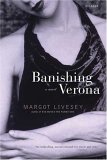Summary | Excerpt | Reading Guide | Reviews | Beyond the Book | Readalikes | Genres & Themes | Author Bio

Chapter One
He had replaced five lightbulbs that day and by late afternoon could not help anticipating the soft ping of the filament flying apart whenever he reached for a switch. The third time, the fixture in the hall, the thought zigzagged across his mind that these little explosions were a sign, like the two dogs he had come across in the autumn, greyhound and bulldog, locked together on the grassy slope of the local park. He had given them a wide berth; still, he had felt responsible when on the bus next day a man turned puce and fell to the floor. By the fifth bulb, though, he had relinquished superstition and was blaming London Electricity. Some irregularity in the current, some unexpected surge, was slaughtering the bulbs. He pictured a man at head office filling his idle minutes by pulling a lever. Meanwhile, hour by hour he emptied the upstairs rooms, slipping the bulbs from bedside lights and desk lamps.
He had just replaced the fifth bulb when the doorbell rang. Often, if he were up a ladder, Zeke didn't bother to answer the knocks and rings of late afternoon; the owners of the house, the Barrows, were away and the callers were never for him. But now the pallor of the sky, the flashes of light and dark, the weariness of working alone, all conspired to make even the prospect of rebuffing a smartly dressed double-glazing salesman, or a disheveled collector for Oxfam, a pleasure. Last Friday, in a similar mood, he had found a boy on the doorstep, thin as a junkie, pretending to be blind. He had the dark glasses, the cane, the fluttery stuff with the hands. You're a painter, he had said, sniffing slightly. Zeke had given him fifty pence. Later he had looked out of the window and seen the boy sitting on a wall, reading a newspaper.
He set aside the wallpaper steamer and went to open the front door. On the doorstep a woman, minus collecting tin or clipboard, filled his vision. He hadn't replaced the hall bulb yet, and in the dim light her features took a moment to assemble. He made out abrupt dark eyebrows above a substantial nose and plump, glistening lips, the opposite of pretty.
Briefly, Zeke was baffled. Then he went through the steps he'd learned from the poster he'd been given at the clinic. Eyes wide, a glimpse of teeth, corners of the mouth turning up rather than down—usually these indicated a smile, which could, he knew, mean anger but often meant the opposite. Yes, she was smiling, although not necessarily for him. Her expression had clearly been prepared in advance, but he admired the way she held her face steady at the sight of him, and of his work clothes. His jeans and shirt were so paint-spattered as to be almost a separate entity.
"Good afternoon." She stretched out a hand and, seeing his, white with plaster, faltered, neither withdrawing nor completing the gesture.
"Hi," he said, hating the single stupid syllable. She was tall for a woman, his height save for the step, and dimly familiar, though not as herself. As she began to speak, he realized who she reminded him of: the bust of Beethoven on his father's piano, something about the expansiveness of her features, the way her tawny hair sprang back from her forehead.
"I'm the Barrows' niece," she said.
In the cold air her breath streamed toward him, feathery plumes, carrying more words, perhaps an entire sentence, which Zeke lost as he took in the little beads of moisture on her upper lip. When her mouth stopped moving he said, "I'm Zeke, the painter. The Barrows are away."
"But they told you I was coming," she said, with no hint of a question. He was still wondering—had they or hadn't they?—when she stooped, and he saw that she was not alone. Before he could offer to help she swept past him, a suitcase in each hand. He turned from closing the door to find she had set the cases at the foot of the stairs and was standing in the doorway, surveying the living room. Under the influence of her attention, Zeke saw again what his work had revealed: the ragged plaster painted not a single color but in pale bands of blue and brown, gray and yellow, the work of some artist he couldn't name. In the middle of the floor, like an ungainly prehistoric animal, squatted the furniture, piled up and draped in dust sheets.
From Banishing Verona by Margot Livesey. Copyright 2004 Margot Livesey. All rights reserved. No part of this book maybe reproduced without written permission from the publisher.




They say that in the end truth will triumph, but it's a lie.
Click Here to find out who said this, as well as discovering other famous literary quotes!
Your guide toexceptional books
BookBrowse seeks out and recommends the best in contemporary fiction and nonfiction—books that not only engage and entertain but also deepen our understanding of ourselves and the world around us.